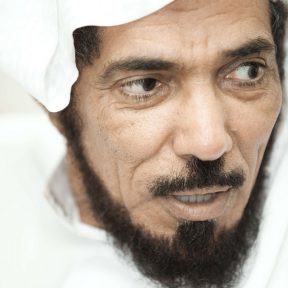
Salman al-Ouda
Photo from Wikimedia Commons / Author of Photo: Emad AlhusayniOverview
* Radical Islamic cleric
* Has close ties to Osama bin Laden
* Claims that “the security of the world is threatened” by “the Jews”
Born in Saudi Arabia in 1955, Salman al-Ouda is an Islamic cleric who was a key figure in the fundamentalist-awakening movement that took place in his country during the 1980s. The author of some fifty books, he currently serves as Director of the Arabic edition of the website Islam Today.
During the Gulf War in 1991, al-Ouda and his better-known colleague, Sheikh Safar al-Hawali, were jailed by Saudi Arabia for criticizing the Saudi government and demanding an end to America’s military presence in the Kingdom.
According to U.S. officials, al-Ouda has provided theological justification for al Qaeda‘s directive that Muslims should wage holy war against the United States.
In the first World Trade Center bombing trial, al-Ouda was identified as a spiritual advisor to Osama bin Laden.
In a February 1995 meeting with members of Iraqi intelligence in Sudan, bin Laden requested that they “dedicate a [television] program” featuring “the broadcasting of Sheikh Salman al-Ouda” in their country.
Federal investigators told the Seattle Post-Intelligencer in March 2003 that al-Ouda and al-Hawali “have direct contact” with bin Laden.
In a number of al Qaeda propaganda videos, bin Laden praised al-Ouda for “enlightening” the Muslim youth and for his support of jihadi causes.
The FBI reports that tapes of al-Ouda’s sermons, which are distributed widely throughout the Middle East, were found in bin Laden’s residence in Afghanistan in the aftermath of 9/11. Phone records also show that al-Ouda made calls to Mounir el-Motassadeq, who was convicted in February 2003 of aiding the 9/11 hijackers.
When Saudi Arabia released al-Ouda and al-Hawali from prison in 1996, they remained committed to supporting violence against the United States and its allies.
In April 2003, shortly after the U.S.-led invasion of Iraq, al-Ouda joined a group of 225 Islamist clerics, scholars, and businessmen — headed by al-Hawali — in establishing a new organization that Israeli academic Dr. Reuven Paz described as “the Supreme Council of Global Jihad.” (One of the members of this group was Ahmad Abu Laban, who would be instrumental in internationalizing the controversy over the Danish Mohammed cartoons in 2006.)
There is evidence connecting al-Ouda to one of the suspected masterminds of the 2004 Madrid train bombings. In September 2004, El Mundo and Corriere della Sera reported that Rabei Osman Ahmed, a former Egyptian army explosives expert and one of the purported masterminds of the bombings, was quoted in conversations wiretapped by Italian authorities as saying that al-Ouda was “everything, everything” to him, and that “I worked for him [al-Ouda] in Spain. I did really well in that period, in which I earned 2,000 euros [$2,400] a month. There were days I earned 1,000 euros [$1,200].”
Under pressure from Saudi authorities, al-Ouda in June 2004 joined other Islamist clerics in condemning terrorist attacks in the Kingdom. But such condemnations did not extend to similar attacks in Iraq. In November 2004, al-Ouda and 25 other Saudi Islamist scholars called on Iraqis to support the insurgency, issuing a letter that stated: “Fighting the [American] occupiers is a duty for all those who are able. It is a jihad to push back the assailants … A Muslim must not inflict harm on any resistance man or inform about them. Instead, they should be supported and protected.”
In March 2005 al-Ouda’s lawyer filed a defamation suit against the Saudi newspaper al-Watan, which had reported that al-Ouda’s son, Muaz, had planned to travel to Iraq to fight the United States, but that his father, fearing that the son would be killed, contacted Assistant Interior Minister for Security Affairs Muhammad ibn Naif and arranged for the son to be captured on the Saudi-Iraqi border.
The University of Southern California’s Muslim Students Association once posted, on its website, an article by al-Ouda in which he argued that “the security of the world is threatened” by “the Jews” and others in “political circles and institutions with executive power in the West.”
Much of this profile was adapted, with permission, from the article “Jihad TV,” written by Dan Darling and published by The Weekly Standard on March 24, 2006.